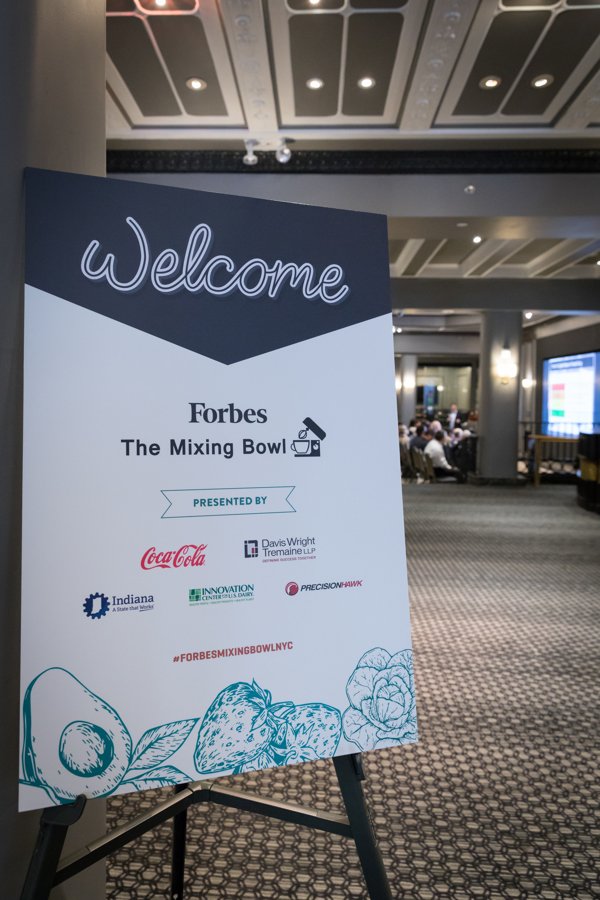The 1's And 0's Of Food & Farming
Lorin Fries attended the Forbes Mixing Bowl NYC event held on March 22nd, 2018 at Forbes on Fifth in Manhattan and is sharing her insights. The Mixing Bowl will be continuing the discussion of the maturity of digital food and agriculture on June 26th at FOOD IT: The Full Stack at UC San Francisco, just before the Forbes Agtech Summit in Salinas, CA.
There is an invisible ingredient in your lunch. What was used to grow those veggies in your salad or the wheat for your sandwich bread? Seeds, soil, water and light...and information. While this currency has always been packaged in tradition and passed through generations, we now have exponentially powerful tools for digitizing, measuring, managing, optimizing and automating data. Such technologies are already impacting the way we produce, transport, buy, consume and discuss our food. The cows that produced your milk may have been monitored with digital tools using artificial intelligence. You have likely had the experience of ordering food through a digital platform or purchasing a meal with a mobile payment app. This is just the beginning. Information technology is about to have a profound influence on the future of food, from seed to stomach.Innovative organizations have begun to convene conversations to navigate this digital revolution and its impact on food systems. Innovators, corporations, chefs, farmers, investors and others gathered recently at an event in New York City hosted by Forbes and The Mixing Bowl, an organization that looks to harness IT for food and agriculture through information-sharing and investments by its funding arm, Better Food Ventures. Participants came together to discuss tech trends and innovations, like controlling the light spectrum for indoor farming to grow vegetables, using voice recognition software for dairy industry management, crunching satellite data to help predict crop forecasting and replacing the restaurant menu with a virtual reality experience.To consider IT a quick fix to our food system problems is naïve. Indeed, the theme of this discussion was around the maturity of the “full digital stack” of food and agriculture. What became apparent were the foundational gaps we still need to address to unlock the potential of IT in this sector. While we have powerful new sensors that can track data on the farm, we may not have the connectivity in rural locations to get even small amounts of data to the cloud for analysis. Without a common language of food-related terms, it will be hard to get broad transparency across our food system and apply budding technologies like blockchain. A discussion on livestock technology showed that in many ways we can better manage the nutrition of a herd of milk cows than of humans. A discussion on restaurant technologies laid bare the challenges of deploying technologies to solve problems even at the highest end of the hospitality food chain.These are critical and valuable conversations. It is increasingly in spaces like these—among data scientists, young companies and venture capital firms—that the future of food and farming is being shaped. It was refreshing to see an engaged, cross-industry audience getting into the practicalities of how to build out the full digital stack of food and agriculture. And from the perspective of global challenges like improving nutrition and mitigating climate change, it’s laudable that some pioneering nonprofit organizations focused on nourishment and companies placing new emphasis on environmental sustainability also joined the mix, putting technology to the task of social impact. As such conversations mature, it will also be important to tackle hard questions at the intersection of IT and our food system such as data ownership and privacy, who will pay for standardization and transparency, and how IT can be used to increase choice and well-being among poorer segments of society.
The food we eat will increasingly be a product of digital information. To realize the full potential of digital food and farming, and harness it to meet society’s needs, we need more of these types of cross-collaborative platforms that bridge the world of ideas with action.
Lorin Fries is the former Head of Food Systems Collaboration at the World Economic Forum. She works as an independent consultant at the intersection of technology and food systems, with a focus on environmental sustainability. Follow her on Twitter.You can find photos of Forbes Mixing Bowl NYC 2018 here.

